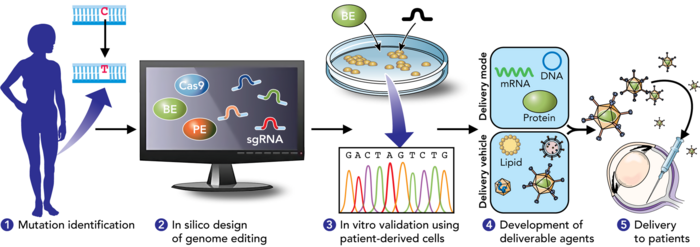Irvine, CA – September 23, 2022 – In a new paper, University of California, Irvine researchers explain how precision genome editing agents have enabled precise gene correction and disease rescue in inherited retinal diseases (IRDs). The study, titled, “Precision genome editing in the eye,” was published this week in the Proceedings of the National Academy of Sciences.

Credit: PNAS
Irvine, CA – September 23, 2022 – In a new paper, University of California, Irvine researchers explain how precision genome editing agents have enabled precise gene correction and disease rescue in inherited retinal diseases (IRDs). The study, titled, “Precision genome editing in the eye,” was published this week in the Proceedings of the National Academy of Sciences.
The paper describes current preclinical successes and clinical genome editing approaches for treating inherited retinal degenerative disease and stresses there is hope that in vivo gene editing will be the future treatment paradigm for IRDs. Currently, there are no effective treatments for these devastating diseases, which commonly result in blindness.
“Genome editing technologies are an excellent approach for targeting the root causes of genetic disorders,” explained Krzysztof Palczewski, PhD, Donald Bren Professor of Ophthalmology at the UCI School of Medicine and corresponding author. “Technologies in genome editing have continuously evolved to enable precise genome editing with fewer side effects and risks, making precision genome editing possible.”
The paper describes progress toward using genome editing for treating IRDs and important considerations for robust clinical translation.
“More and more CRISPR-based treatment approaches are being tested in clinical trials,” said Palczewski. “We believe that there will be an increasing number of clinical trials for targeting IRDs and that any mutation that causes them will be amenable to treatment with this approach.”
Programmable CRISPR-Cas nucleases are effective tools for gene disruption, but they are poorly suited for precisely correcting pathogenic mutations in most therapeutic settings. Improvements are needed for clinical translation.
Inherited retinal diseases (IRDs) are a genetically heterogeneous group of blinding disorders characterized by a progressive degeneration of the photoreceptors as well as the retinal pigment epithelium (RPE). These disorders affect ∼1 in 3,000 individuals worldwide and profoundly impact patients’ quality of life. IRDs are caused by mutations in genes that are critical for development and/or function of the retina or RPE, and more than 270 causative genes have been identified.
Over the past two decades, major advances in gene therapy have engendered new hopes for successful treatment of these IRDs. Most recently, precision genome editing agents, including base editors (BEs) and prime editors (PEs), developed by The Liu Lab, have enabled efficient and precise target gene correction, rather than gene disruption, in various therapeutic settings, including mouse models of IRDs. Precise target gene correction greatly expands the potential therapeutic applications of genome editing technologies, since most genetic disorders cannot be treated by gene disruption.
“Precision medicine for IRDs has a promising outlook, as basic science has consistently led to the development of therapeutic tools to target patient-specific genetic mutations,” said Palczewski. “The results of initial clinical trials, that use in vivo gene editing to treat IRDs, will be essential for informing the design and translation of future precision genome editing therapies.”
This work was done in collaboration with David R. Liu, and supported in part by the National Institutes of Health, National Science Foundation, Howard Hughes Medical Institute and Research to Prevent Blindness.
About the UCI School of Medicine: Each year, the UCI School of Medicine educates more than 400 medical students, and nearly 150 doctoral and master’s students. More than 700 residents and fellows are trained at UCI Medical Center and affiliated institutions. The School of Medicine offers an MD; a dual MD/PhD medical scientist training program; and PhDs and master’s degrees in anatomy and neurobiology, biomedical sciences, genetic counseling, epidemiology, environmental health sciences, pathology, pharmacology, physiology and biophysics, and translational sciences. Medical students also may pursue an MD/MBA, an MD/master’s in public health, or an MD/master’s degree through one of three mission-based programs: the Health Education to Advance Leaders in Integrative Medicine (HEAL-IM), the Leadership Education to Advance Diversity-African, Black and Caribbean (LEAD-ABC), and the Program in Medical Education for the Latino Community (PRIME-LC). The UCI School of Medicine is accredited by the Liaison Committee on Medical Accreditation and ranks among the top 50 nationwide for research. For more information, visit som.uci.edu.
Journal
Proceedings of the National Academy of Sciences
DOI
10.1073/pnas.2210104119
Article Title
Precision genome editing in the eye
Article Publication Date
19-Sep-2022




